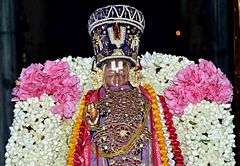Prathivadhi Bhayankaram Annangaracharya
| Prathivadhi Bhayankaram Annan | |
|---|---|
|
Sri Prathivadhi Bayankaram Anna Vendanthacharya | |
| Born |
Hasthigirinatha Kanchipuram |
| Children | Annanappa, Ananthacharyar |
| Titles/honours | "Prativadibhayankar" |
| Denomination | Sri Vaishnavism |
| Guru | Varada Nayanacharya , Manavala Mamunigal |
| Philosophy | Vishishtadvaita |
| Literary works | short vyakhyas(commentaries) for sri bhashya, sri bhagavatam, subalopanishad, vyakhya for bhattar’s ashtasloki , sri venkatesa suprabhatam, stotram, prapatti, mangalasasanam as per the divine orders of mamunigal , varavaramuni sathakam (100 slOkas in samskritham in glorification of mamunigal), varavaramuni mangalam , varavaramuni suprabhatam , "cheyya thamarai thalinai vazhiye…" – vazhi thirunamam of mamunigaL(recited at the end of aruLicheyal goshti),Other sloka/stotra granthams |
| Notable disciple(s) | annanappa, anantacharyar, azhagiya manavaLa perumal nayanar |
Prathivadhi Bhayankaram Annan was a Sri Vaishnava Acharya, Sanskrit scholar and the composer of the popular Venkateswara Suprabhatam. He was born as Hasthigirinathar Annan in the year AD 1361. He was one of the prominent disciples of Manavala Mamunigal, belonged to a distinguished line of "Acharya Purushas" and had a large number of followers. Annan composed many poems, of which the popular Venkatesha Suprabhatham, Venkatesha Stotram, Venkatesha Prapatti and Venkatesha Mangalashasanams are recited daily at the Tirumala Venkateswara Temple at the wee-hours of the day to wake up the Lord. It is played each day at millions of households in India sung by Smt. M S Subbulakshmi.[1][2][3]
Annan was born in Kanchipuram, and initiated into the Sri Vaishnava Sampradayam by his father, who was the 10th generation descendant of Mudumbai Nambi one of the 74 simhasanadipathis appointed by Ramanuja.[4] He later became a disciple of Vedanta Desika's son Nayana-Varadacharya.[5] Nayana-Varadacharya him the name "Prathivathi Bhayangaram Annan".[6] Annan was acknowledged as an authority on Sanskrit literature and spiritual discourses in those times. He is said to be the most prominent scholar in South India of his time, and was widely respected throughout India. After studying Sribhashyam from Nayana-Varadacharya, Anna went to Tirumala Venkateswara Temple and did devotional service to Lord Venkateshwara.
At the Tirumala Venkateswara Temple, Annan heard the glories of Manavala Mamuni and about his nectarine discourses on the works of the Azhwars and the doctorines of Sri Vaishnava Sampradayam. Following this, Annan became the disciple of Manavala Mamuni and learnt the entire commentaries of these works from him a Srirangam. At the time Annan surrendered at the feet of Manavala Mamuni, Manavala Mamuni gave him the dasya nama "Sri Vaishnava Dasan" seeing his humility towards the devotees of the Lord. Further, Manavala Mamuni, after seeing Annan's prowess in Sribhashyam, bestowed him the Sribhashya Simhasanam and the title 'Sribhashyacharya'. Annan also served as one of the ashta-dik-gajas of Manavala Mamuni.[7]
Annan's descendants have settled in various parts of the country and worked tireless in spreading the spiritual humanism propagated by Nammazhwar, Ramanuja, Vedanta Desika, Manavala Mamuni and Prathivadi Bhayankaram Annan himself.
People often confuse Prathivadhi Bhayankaram Annan with a 20th Century Scholar-Acharya Prathivadhi Bhayankaram Annangaracharya, who was one of the first acharyas to publish the entire works of Sri Vaishnava acharyas like Azhwars, Ramanuja, Vedanta Desika, Manavala Mamuni etc., in the first half of the 20th Century.
The twelve divya Saligrama silas and the Sri-Bhu Sametha Ranganatha Swamy idol that were once worshiped by him are now being worshiped by Sri Prativadhi Bhayankaram Raghavacharyulu, a fifteenth generation descendant in his lineage in Vijayawada, Andhra Pradesh. Popular Indian Playback Singer P. B. Sreenivas was one of his descendants in his lineage in Kakinada, Andhra Pradesh.
References
- ↑ http://guruparamparai.wordpress.com/2013/08/06/prathivadhi-bhayankaram-annan/
- ↑ http://www.ibiblio.org/sripedia/oppiliappan/archives/aug03/msg00100.html
- ↑ http://srirangapankajam.com/archives-mamunigal/
- ↑ http://www.ramanuja.org/sv/bhakti/archives/oct95/0188.html
- ↑ http://www.ramanuja.org/sv/bhakti/archives/oct95/0188.html
- ↑ http://www.ramanuja.org/sv/bhakti/archives/oct95/0188.html
- ↑ https://guruparamparai.wordpress.com/2013/08/06/prathivadhi-bhayankaram-annan
